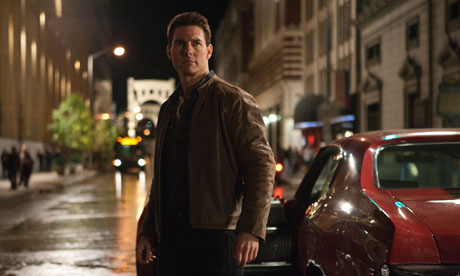
There have been a number of cases over the years when consideration for public opinion has led distributors to postpone the release of movies. In the last weeks of the second world war the morale-boosting Hollywood picture Objective Burma! was withdrawn from British cinemas shortly after it opened (and shelved for seven years) because of protests against the slighting of our "Forgotten Army" in Burma. In 1963 Dr Strangelove was postponed due to the Kennedy assassination, and a jokey reference to Dallas was changed to Vegas, thus puzzling lip-readers. The 1992 Los Angeles riots following the acquittal of Rodney King's assailants led to Walter Hill's Looters being cancelled; it appeared later, renamed Trespass. Many movies were anxiously re-edited after 9/11, and more recently the British release of Ben Affleck's kidnapping thriller Gone Baby Gone was delayed because of the continuing search for Madeleine McCann.
Something similar happened earlier this month in the States with the postponement of the national release of Jack Reacher after the Newtown massacre. It was at the behest of its producers (one of them Tom Cruise), who naturally felt concern for the sensitivities of the victims' families as well as a reluctance to attract censorious attention to a thriller that opens with an assassin coolly picking off apparently random targets in a provincial city.
The deranged mass murderer has of course been a regular figure in American cinema for nearly 50 years, ever since Peter Bogdanovich's 1967 directorial debut, Targets, a low-budget film inspired by the appalling incident on the University of Texas's Austin campus the previous year. A deranged ex-student, Charles Whitman, murdered his wife and mother and then shot 44 people from the university tower, killing 14 of them before being brought down himself. Although made for Roger Corman's exploitation studio, Bogdanovich's picture was sensitive and responsible, though not something you'd pay to see in the wake of a similar spree. But then who'd want to see Gus Van Sant's Elephant or Lynne Ramsay's We Need to Talk About Kevin this month anywhere?
The riveting opening 15 minutes is what makes Jack Reacher worth seeing. A killer drives into a multi-storey car park in midtown Pittsburgh, sets himself up – looking across the river to a path alongside the Pittsburgh Pirates stadium – and proceeds to observe potential targets, several of them children, through the crosshairs of a sniper's rifle. It's a guiltily involving point of view.
He kills five people then makes his getaway. Here we see the hand of writer-director (and former private detective) Christopher McQuarrie. He won an Oscar as screenwriter on The Usual Suspects, which opens in similar lapel-grabbing fashion, though this film soon reveals itself as belonging in an inferior class. The assassin is rapidly identified as Iraq veteran James Barr by a smart homicide cop (David Oyelowo) and brought before the local DA (Richard Jenkins), who wants a quick confession to complete his 100% record. The man has obviously been framed. But how, by whom and for what purpose?
This brings us to the title and the film's chef attraction. The former British TV producer Jim Grant (20-odd years with Granada) has been publishing hard-boiled crime novels about Jack Reacher annually since 1997 under the pseudonym Lee Child. This film is based on the 2005 One Shot, written in a sawn-off post-Hemingway style that dispenses with verbs wherever possible. Reacher is a reclusive ex-military police officer, a graduate of West Point with a brilliant forensic intelligence, a control freak and possibly borderline psychopath.
He's 6ft 5in and built like a brick White House. This makes Tom Cruise, who's as short as Alan Ladd, unlikely casting. Though not bad in the right role, he's more cocky and devious than mysterious and unassailable. In his defence, however, Child has gallantly said: "With another actor you might get 100% of the height but only 90% of Reacher. With Tom you'll get 100% of Reacher with 90% of the height."
Reacher turns up from nowhere to needle the DA and the homicide cops and collaborate with the DA's estranged daughter (Rosamund Pike), a top attorney charged with defending Barr. He reveals that the suspect was trained as a sniper in Iraq and murdered some US contractors who turned out to be bad guys. But he didn't do this job.
Who actually was responsible is inadequately explained and explored in McQuarrie's slick, shallow film. Cruise makes little impression, and when at the end he appears to be driving off in search of a sequel, one wonders if he has the making of a Bourne-again serial hero. He seems more overreacher than Reacher, while the dependable Jenkins and the seductive Pike drift through the action with nothing to get a purchase on. Sadly, McQuarrie provides little of the cool wit and none of the dramatic fibre he brought to The Usual Suspects or his other film as director, the bizarre The Way of the Gun.
There are, however, certain fringe benefits, most involving Werner Herzog and Robert Duvall. Playing a sadistic, one-eyed Russian mafioso, Herzog is as frighteningly crazy as Klaus Kinski. He's a tough-as-tundra survivor of the Gulag and known simply as the Zec (Soviet slang for jailbird). Not the kind of person in whose presence you'd risk saying: "No zecs please, we're British."
Duvall is characteristically excellent, bringing pawky humour and ill-concealed menace to the role of an ex-army gunnery sergeant. A sort of Colonel Kilgore in civvies, he runs a rural rifle range as big as a civil war battlefield. That really does bring us into the creepy world of American gun culture.

